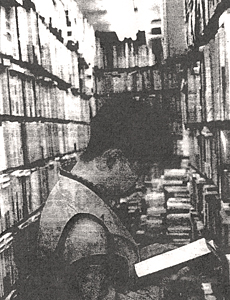『ネットワード・インターナショナル・サービス(以下、Netword)』会長、『パシフィック異文化教育アカデミー(以下、PCA)』学院長「ハロルド・A・ドレイク」がメディア掲載、取材等で取り上げられた記事を紹介致します。
以下、掲載記事
A literary lucky by Hal Drake
Mainichi Daily
Sunday mail Nov. 2′ 97

PACKING up to leave Tokyo after almost 40 years in Japan, I found what I thought was a lost literary treasure — a battered old copy of Blinky Bill, once a dear possession of my grown-and-gone son.
I fondly recalled how we came by this — a gift from a friend who bought it along the Jinbocho, two long blocks of second-hand bookstores in the Kanda district.
How did he ever find the Dorothy Wall children’s classic in the ruck and disorder of the Jinbocho, the bustling literary bargain counter that sprawls over two blocks of north-eastern Tokyo?
It is full of beyond-count shops, each indistinguishable from the other, all with the same sliding glass doors and flyspecked windows — And the same carelessly heaped commodity. Books, in every language, on all subjects.
There are tattered paperbacks by Mickey Spillane — and no dealer on the Jinbocho is ashamed to put them close to thick, heavy books whose old bindings creak like rusty hinges as you open them, perhaps discovering a 1790 edition of Samuel Johnson’s Dictionary of the English Language.
A gold-lettered, morocco-bound edition of Das Kapital is very expensive and beyond the means of the proletarians who patronise second-hand bookstores.
In one nondescript shop were bound volumes of the Weekly London Times, a complete set for 1916, which told of the Easter Rebellion in Dublin and the ghastly Battle of the Somme. Below those, an ornamental edition of Victor Hugo’s Toilers of the Sea nestled up to Vina Delmar’s Kept Woman, once a shocker but now a pale and dated portrait of the 1920s.
Hugo was also banked by an old, well-kept edition of General Lew Wallace’s Ben Hur. It once had a living owner. Written inside the cover was “With love to Willie from Cousin Charlie — Dec 25/(18)89.”
There’s an odd, carelessly stirred literary mix down the main drag and along the side alleyways, books that cover every country, philosophy, fact or fiction on any turn of history — Ambrose Bierce and Banjo Paterson, River Phonix and Philo Vance, Sidney Sheldon and Shakespeare, Monty Python and Picasso, Nikolai Lenin and Eric Lambert, The Price Guide for Coca-Cola Bottles and Posters, The Machinery Handbook and Ernest Hemingway’s Death in the Afternoon.
Does anyone on this long boulevard know Thomas Mann from Erskine Caldwell? You wonder as you see Josef and Seine Bruder nesting with Tobacco Road?
It doesn’t appear so. Few shopkeepers appreciate literary values, making the Jinbocho a treasure trove of rare finds.
One collector tried, through many dealers in the US, to find Farmers of 40 Centuries.
This is a definitive and documented reference on Asian farming written in 1911 by an American professor of agriculture who travelled extensively in Japan. china and Korea. It was privately printed and extremely rare.
One day, as the collector browsed through the Jinbocho’s outdoor bookstalls, he found that old work heaped with others like mackerel in a fish market. The yen equivalent of 50¢ took it home.
Bargains begin to abound at 10am when the bookstores raise their shutters and outdoor stalls are wheeled to the sidewalks.
A whole set of Encyclopaedia Britannica for $A40? Well, it is a bit outdated, identifying Korea as the colonial property of Japan.
The chapter on makeup was written by Lon Chaney, the silent screen master of horrific disguise.
Some stores can take weight off a shopper’s wallet. The Isseido, 90 years old, is full of knowledgeable dealers who catalogue their goods and offer no markdown.
That 1882 edition of Nana went right from Emile Zola’s pen to a press in Paris. Has it been there, never sold, since the Isseido welcomed its first customers in 1907? Shaking his head, a young clerk can only quote a stay away price — $A685 in yen.
Many books are castoffs from libraries. There are three universities within a walk and others close by.
And generations of departing foreign residents, finding disused books to be troublesome luggage, took them to the Jinbocho.
How long had Binky Bill been there before my friend found it for my toddler? It had been indifferently thrown on a disorderly pile?
掲載記事:【デイリー毎日(サンデーメール) 1997.11.02】